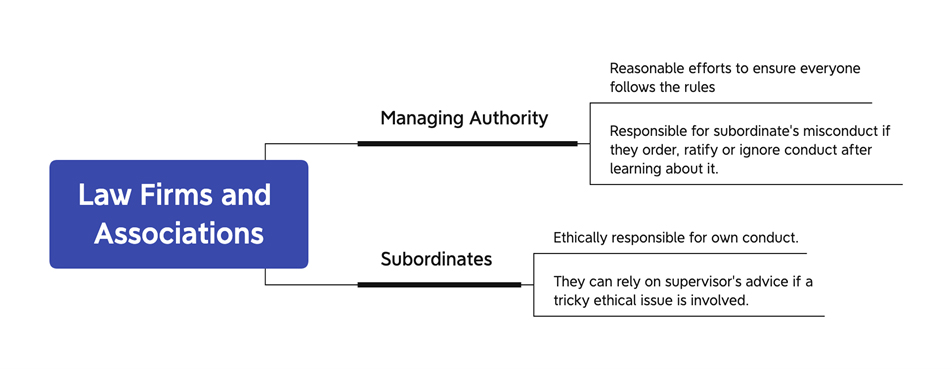11 Recap

Who Is Regulated and What Is the “Practice of Law?”
The state bar regulates licensed attorneys and non-attorneys engaging in the unauthorized practice of law. Remember Mike Ross from the hit TV show Suits?
What Is the Practice of Law?
ABA Model Rule 5.5, Comment 2 indicates that states determine what the practice of law means. Included in Comment 2 is an acknowledgment that the practice of law is limited to members of the bar only. This protects the public from unqualified persons.
Many states follow California’s definition of the practice of law. In California, the practice of law includes
- performing services in a court case/litigation;
- preparing legal documents like contracts and wills that secure legal rights; and
- giving legal advice.[1]
To practice law, one must be licensed in that state. Each state is free to determine how and what type of licensing they want to administer. Every state in the United States administers a bar exam and a multistate professional responsibility exam (MPRE).[2] To pass, applicants must receive a predetermined score, which varies with each state.
Additionally, the state bar assesses each candidate’s moral character based on a compilation of many details of the applicant’s life. The state bar reviews each applicant’s history. If there are pending questions about the applicant’s good moral character, the applicant will be invited to attend an informal conference with the state bar to convince state bar officials of their moral character and qualification to practice law in such state.

Read or listen to the following article: “Infamous Reporter Stephen Glass Vies for Bar Admission.” The California bar ultimately decided against admitting Stephen Glass for admission to the bar. Do you agree or disagree with this decision?
Temporary Practice of Law in Another Jurisdiction
In some cases, lawyers may practice law temporarily in another jurisdiction. Usually, this requires special permission from the tribunal where the lawyer wants to appear (called pro-hac vice admission) or by associating with local counsel in that jurisdiction.[3] In some cases, like in mediation or arbitration, the lawyer may participate without special permission due to the non-trial nature of these proceedings. Such participation must arise out of or be reasonably related to a pending arbitration or mediation— for example, a cruise ship passage contract that provides that disputes are to be resolved in California, even though an incident or injury may arise in another jurisdiction where the cruise ship traveled to.
ABA Model Rule 5.5(c)(4) accounts for situations not covered above but arising from or reasonably related to the attorney’s practice in a jurisdiction where that attorney is admitted to practice law. For example, in today’s global marketplace, we may have an American corporation that employs individuals all over the country or even throughout the world. Each employee is governed by the employment laws of the individual state that the employee resides in. An employment lawyer from that company would need to understand, and maybe even practice, if necessary, the laws of any state where an employment claim would be filed. We provide this example as more of a hypothetical as most corporations would hire local counsel in the state who could already practice law in that state to handle any lawsuits. However, it is not unheard of for a company’s own lawyers to handle litigation in another state for various reasons, including costs, knowledge of the matter, or a business-related interest.
When Have Lawyers Violated This Rule?
Lawyers should be careful to ensure that a temporary practice remains temporary. In Gould v. Florida Bar, the 11th Circuit confirmed the district court’s finding that a New York attorney, who was not admitted to the Florida bar, does not have the authority to practice New York law in Florida state courts. In this case, the attorney attempted to regularly practice New York law in Florida, which was prohibited.
We acknowledge that the recent pandemic (COVID-19) has changed the practice of law. Today, many state bars have waived strict enforcement of UPL laws (see below) when lawyers practice law in another state. With virtual practices growing in popularity, we suspect many lawyers will live in one state while practicing the law of another state, similar to the attorney in Gould. Thus, the decision in Gould could have little applicability today as states adapt to this new normal.
Other Exceptions
ABA Model Rule 5.5(d)-(e) creates a safe harbor for in-house counsel admitted in a US jurisdiction but may not be practicing in the jurisdiction where they are licensed. For example, Attorney A is admitted in New York but works in-house for ABC Corporation, headquartered in California. Although Attorney A is only licensed in New York and not in California, he has not engaged in the unauthorized practice of law by working in California so long as he registers with the California state bar. Like many other states, California still requires in-house counsel to register with their state bar as “registered in-house counsel.”
- In re Garcia (9th Cir. BAP 2005) 335 B.R. 717, 728. ↵
- It should be noted that Wisconsin is the only state with diploma privilege, where applicants must meet a set of course and grade requirements. They may practice law without taking a bar exam if they fulfill these requirements. ↵
- ABA Model Rule 5.5(c)(1)(2). ↵